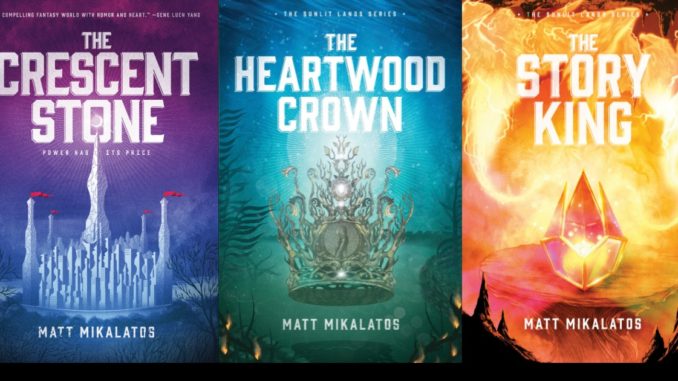
Podcast: Play in new window | Download
Subscribe: Apple Podcasts | RSS
In 2018, Matt Mikalatos released book one of his fantasy trilogy The Sunlit Lands. Imagine, if you will, that C.S. Lewis was writing to teenagers instead of elementary schoolchildren and you’ll have a pretty good idea of what The Sunlit Lands is like. Mikalatos is exquisite in his worldbuilding, bringing together a rich and complex fantasy land that only becomes more nuanced and fully realized as the series progresses. While many things hold symbolism, not everything does; while many things have thematic similarities to real-world events, it’s never a strict analogy. The result is one that forces readers to slow down, take everything in, sort through it thoughtfully, and follow the characters on their own journeys of discovery.
Today, the final book in the trilogy, The Story King, was released and to celebrate I’m releasing my conversation with Matt about the series. It’s over an hour long—so more of a double episode—but hey, we had three books to talk about and there’s a lot to be said about literature, social justice, and their intersection. It’s a fun conversation.
The Interview | Matt Mikalatos
This transcript is edited for clarity and brevity. Catch the full interview at the audio player above or wherever you get your podcasts.
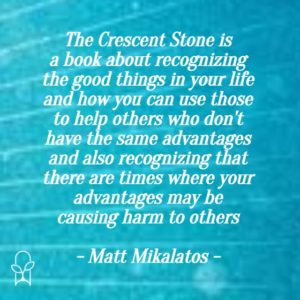 Matt Mikalatos: So maybe it would be helpful to tell you how the series started. Growing up, some of the first books I remember reading, were The Hobbit and The Lord of the Rings, when I was too young for them. And then I read the Narnia books and, I’m like, Oh, these are so much easier to read. Why didn’t someone give me these?
Matt Mikalatos: So maybe it would be helpful to tell you how the series started. Growing up, some of the first books I remember reading, were The Hobbit and The Lord of the Rings, when I was too young for them. And then I read the Narnia books and, I’m like, Oh, these are so much easier to read. Why didn’t someone give me these?
So I’ve been publishing books at Tyndale for almost 15 years. And what happened is a friend of mine, became an acquisitions editor, and I just sent her a note and said that we should do a book together sometime. And she’s gonna be working on kids’ books. So the person in charge of children’s books at Tyndale reached out to me—her name is Linda Howard. And she said, Let’s get a meal. I’m gonna be in town. And my good friend, Sarah Atkinson was there. And I said, if you can have any book, what would you want? And she was like, I would love a fantasy series. We’re getting a lot of questions from people about helping their young adults deal with issues related to race and privilege and those sorts of questions. And it’s just, it’s a hard topic to approach.
And as it happens, this is a topic I’ve spent a lot of time on for a lot of years. Now I’m white. But with the guidance of a bunch of my friends who are people of color, I’ve walked through a lot of things, read a lot of things. And so I was like, this sounds amazing. And actually, fantasy novels are pretty well set up to talk about this sort of thing.
Josh Olds: So there’s the background. You wanted to set up a fantasy series that spoke about race and privilege. How did that play out in the trilogy?
Matt Mikalatos: Let me just walk you through the trilogy just schematically. We start with The Crescent Stone, where what we’re really exploring is the question of privilege. And when I say privilege, what I mean is: something about your life that is an advantage that you would not have given some if you had a different set of qualities about your life. Our main character is a woman named Madeline, who has a lot of privilege in a variety of ways. She’s white. She’s from an upper-class family. She’s smart, she’s athletic, she’s popular, she’s good at pretty much everything she tries her hand at. But you know, that’s not super fun in a novel. So she also has a complexity: she doesn’t have good health; she actually has a terminal illness.
So, what happens is, someone comes from this fantasy world into her world and says, “I will heal you completely if you’ll come and work for us and fight in this war. Just fight for a year. And assuming all goes well, you’ll be completely healed, and we’ll send you home.” And so she agrees to that because she has a terminal disease. What else is she going to do? And her some of her close friends go with her. A guy named Jason Wu, who’s her chemistry partner, and others—I don’t want to give any spoilers.
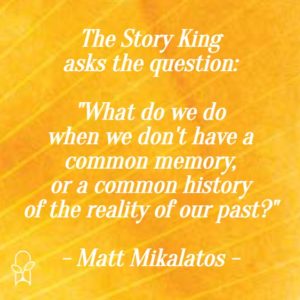 But what happens is, it becomes a book about recognizing the good things in your life and how you can use those to help others who don’t have the same advantages. And also just recognizing that there are times where your advantages may be causing harm to others. And, and that it’s complicated, right? So the books are fun. It’s funny, it’s not preachy. I mean, most people don’t feel like it’s preachy. So that’s kind of the first book is exploring that question.
But what happens is, it becomes a book about recognizing the good things in your life and how you can use those to help others who don’t have the same advantages. And also just recognizing that there are times where your advantages may be causing harm to others. And, and that it’s complicated, right? So the books are fun. It’s funny, it’s not preachy. I mean, most people don’t feel like it’s preachy. So that’s kind of the first book is exploring that question.
Then in the second book, we start exploring, okay, so we know there’s injustice in the world, and a lot of it is in the systems or the politics or the governments or the laws or just cultural issues between us like all these things—How do you even deal with that? That’s a lot of what’s happening in the second book, as our heroes have discovered some underlying issues in The Sunlit Lands, and they’re trying to help find a solution. And then the third book explores the question of, well, a variety of questions, but one of the key ones is:
“What do we do when we don’t have a common memory, or a common history of the reality of our past as individuals, as communities, as nations, or as a world? What do we do with the fact that maybe we disagree about the past, or we’ve forgotten things? And we’re not even sure of our own selves, as human beings?” Which is a complex question, one really best addressed in fiction.
The Books | The Sunlit Lands
The Crescent Stone
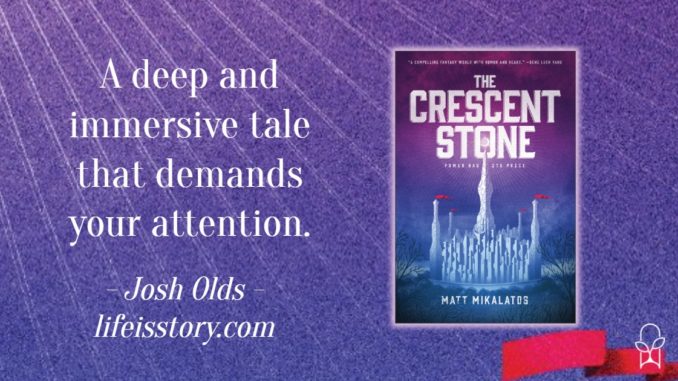
A girl with a deadly lung disease . . .
A boy with a tragic past . . .
A land where the sun never sets but darkness still creeps in . . .
Madeline Oliver has never wanted for anything, but now she would give anything just to breathe. Jason Wu skates through life on jokes, but when a tragedy leaves him guilt-stricken, he promises to tell only the truth, no matter the price. When a mysterious stranger named Hanali appears to Madeline and offers to heal her in exchange for one year of service to his people, Madeline and Jason are swept into a strange land where they don’t know the rules and where their decisions carry consequences that reach farther than they could ever guess.
The Heartwood Crown
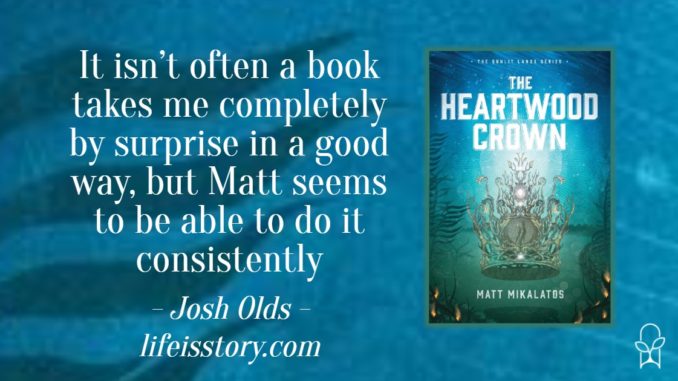
After destroying the Crescent Stone, Madeline returns home, bringing Shula and Yenil with her. As her health continues to deteriorate, Madeline feels the Sunlit Lands calling her back. Meanwhile, Jason, Darius, and the rest of the inhabitants of the Sunlit Lands fight for survival and freedom. The magic that fuels the land is failing, threatening to destroy them all. Will Madeline’s return save the land and its people? Matt’s signature humor and epic storytelling are once again on full display in The Heartwood Crown.
The Story King
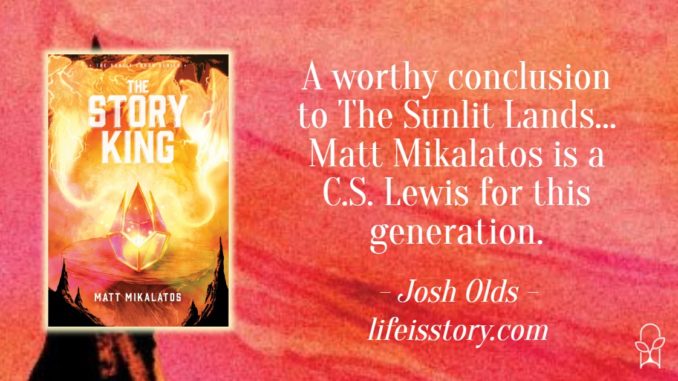
In the third and final installment in the Sunlit Lands series, the magic of the Sunlit Lands has been reset, but that doesn’t mean all is well. Unrest and discord are growing by the day, and Hanali is positioning himself as ruler of the Sunlit Lands. But, in order for Hanali to seize control, there must be a sacrifice, one that very few are willing to make. Jason, Shula, Baileya, and others must work together to save the lives of those Hanali would sacrifice for his own gain.
The Author | Matt Mikalatos
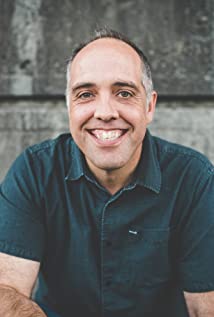 Matt Mikalatos entered Middle Earth in third grade and quickly went from there to Narnia, kindling a lifelong love of fantasy novels that are rich in adventure and explore deep questions about life and the world we live in. He believes in the hopeful vision of those two fantasy worlds in particular: the Stone Table will always be broken; the King will always return; love and friendship empower us and change the world.
Matt Mikalatos entered Middle Earth in third grade and quickly went from there to Narnia, kindling a lifelong love of fantasy novels that are rich in adventure and explore deep questions about life and the world we live in. He believes in the hopeful vision of those two fantasy worlds in particular: the Stone Table will always be broken; the King will always return; love and friendship empower us and change the world.
For the last two decades Matt has worked in a nonprofit organization committed to creating a safer, more loving world by teaching people how to love one another, accept love themselves, and live good lives. He has lived in East Asia and served all over the world. He has had his phones tapped by foreign governments, has had his apartment broken into, and has been punched in the head by a demon-possessed person.
Matt’s science fiction and fantasy short stories have been published in a variety of places, including Nature Futures, Daily Science Fiction, and the Unidentified Funny Objects anthologies. His nonfiction work has appeared on Time.com, the Today Show website, and Relevant magazine, among others. Matt lives in the Portland, Oregon, area with his wife and three daughters.
